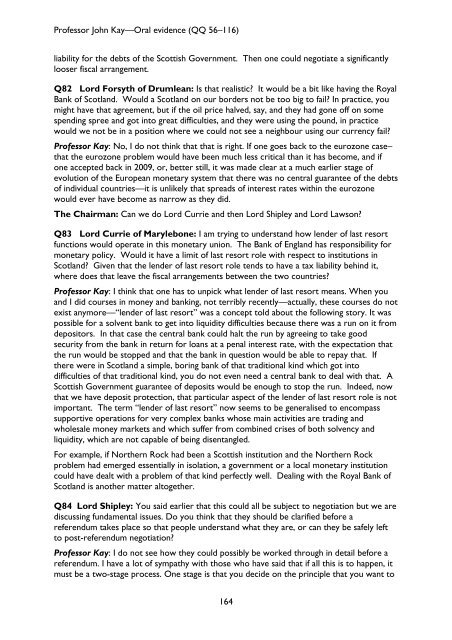SELECT COMMITTEE ON ECONOMIC AFFAIRS - Parliament
SELECT COMMITTEE ON ECONOMIC AFFAIRS - Parliament
SELECT COMMITTEE ON ECONOMIC AFFAIRS - Parliament
You also want an ePaper? Increase the reach of your titles
YUMPU automatically turns print PDFs into web optimized ePapers that Google loves.
Professor John Kay—Oral evidence (QQ 56–116)<br />
liability for the debts of the Scottish Government. Then one could negotiate a significantly<br />
looser fiscal arrangement.<br />
Q82 Lord Forsyth of Drumlean: Is that realistic? It would be a bit like having the Royal<br />
Bank of Scotland. Would a Scotland on our borders not be too big to fail? In practice, you<br />
might have that agreement, but if the oil price halved, say, and they had gone off on some<br />
spending spree and got into great difficulties, and they were using the pound, in practice<br />
would we not be in a position where we could not see a neighbour using our currency fail?<br />
Professor Kay: No, I do not think that that is right. If one goes back to the eurozone case–<br />
that the eurozone problem would have been much less critical than it has become, and if<br />
one accepted back in 2009, or, better still, it was made clear at a much earlier stage of<br />
evolution of the European monetary system that there was no central guarantee of the debts<br />
of individual countries—it is unlikely that spreads of interest rates within the eurozone<br />
would ever have become as narrow as they did.<br />
The Chairman: Can we do Lord Currie and then Lord Shipley and Lord Lawson?<br />
Q83 Lord Currie of Marylebone: I am trying to understand how lender of last resort<br />
functions would operate in this monetary union. The Bank of England has responsibility for<br />
monetary policy. Would it have a limit of last resort role with respect to institutions in<br />
Scotland? Given that the lender of last resort role tends to have a tax liability behind it,<br />
where does that leave the fiscal arrangements between the two countries?<br />
Professor Kay: I think that one has to unpick what lender of last resort means. When you<br />
and I did courses in money and banking, not terribly recently—actually, these courses do not<br />
exist anymore—“lender of last resort” was a concept told about the following story. It was<br />
possible for a solvent bank to get into liquidity difficulties because there was a run on it from<br />
depositors. In that case the central bank could halt the run by agreeing to take good<br />
security from the bank in return for loans at a penal interest rate, with the expectation that<br />
the run would be stopped and that the bank in question would be able to repay that. If<br />
there were in Scotland a simple, boring bank of that traditional kind which got into<br />
difficulties of that traditional kind, you do not even need a central bank to deal with that. A<br />
Scottish Government guarantee of deposits would be enough to stop the run. Indeed, now<br />
that we have deposit protection, that particular aspect of the lender of last resort role is not<br />
important. The term “lender of last resort” now seems to be generalised to encompass<br />
supportive operations for very complex banks whose main activities are trading and<br />
wholesale money markets and which suffer from combined crises of both solvency and<br />
liquidity, which are not capable of being disentangled.<br />
For example, if Northern Rock had been a Scottish institution and the Northern Rock<br />
problem had emerged essentially in isolation, a government or a local monetary institution<br />
could have dealt with a problem of that kind perfectly well. Dealing with the Royal Bank of<br />
Scotland is another matter altogether.<br />
Q84 Lord Shipley: You said earlier that this could all be subject to negotiation but we are<br />
discussing fundamental issues. Do you think that they should be clarified before a<br />
referendum takes place so that people understand what they are, or can they be safely left<br />
to post-referendum negotiation?<br />
Professor Kay: I do not see how they could possibly be worked through in detail before a<br />
referendum. I have a lot of sympathy with those who have said that if all this is to happen, it<br />
must be a two-stage process. One stage is that you decide on the principle that you want to<br />
164

















